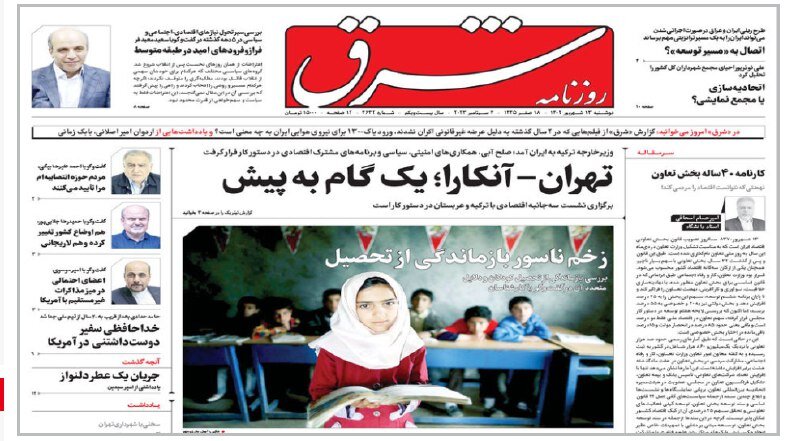Iran and America are moving toward understanding

In a note, Shargh discussed the process of Iran-U.S. agreements and said: Analysts believe that slowing down the uranium enrichment at high levels by Iran can help reduce tensions between Iran and the U.S., but it does not mean the progress towards a wider nuclear agreement before the 2024 U.S. presidential election.
Decreasing the speed of Iran's nuclear program may be enough for the United States and Iran instead of investigating what they describe as "understandings" - the things that Washington has never acknowledged. Analysts emphasize that this does not necessarily mean any real limits on Iran's nuclear program before the Nov. 20, 2024 election in the U.S. but it may help President Joe Biden, who is seeking reelection, to get rid of the political crisis with Iran. The decrease in the speed of the 60% uranium is a clear sign that Tehran is ready to advance the "understandings" to reduce tension with Washington.
Sobh-e-No: Interaction increases the stability of the region
In a commentary, Sobh-e-No discussed the recent visit of Turkish Foreign Minister Hakan Fidan to Iran. It said: A trip that has an important impact on regional equations and events because of the regional and diplomatic relations of both countries. And, regarding the multilateral approach of both countries, the diplomatic relationship between Iran and Turkey seems to be an important political emergency. Issues of economic, commercial, political, regional, trans-regional, cultural and national categories are running between both countries. According to recent international events and the position of neighboring countries towards the security process in West Asia, the diplomatic efforts of Iran and Turkey as traditional rivals and regional powers are an obligation for the approach of the diplomatic systems of these two countries. From this trip, we can conclude that Iran and Turkey consider themselves to play an important role in maintaining the security and stability of the region. As the experts say, after the Syrian war, Iran and Turkey reached such a maturity in their relations that they can talk to each other about both the disputed cases and the joint cases separately and find a solution for them.
Javan: Failure of Western media in censoring Arbaeen march
In an analysis, Javan addressed the Western media's failure in censoring the Arbaeen procession. It wrote: Holding Husseini Arbaeen procession shows the formation of a new and huge axis of resistance against the Western world and global arrogance. This is a piece of bad and unfortunate news for the Zionist regime in the first place, and in the next view it sends a firm message to the Western world that the Islamic world is resisting with remarkable strength and power against their aggression and extravagance. After the Husseini Arbaeen marches were held in Iraq, the Western world saw itself in front of a large and united front of Muslims, which could no longer violate their rights or oppress them. Because of this, we notice that the chain of Western media with the coordination and instructions received from the lobbyists who plan and implement policies, got the order to completely boycott the Arbaeen march and not cover the news. However, after several days of inactivity, the Western media were forced to address the amazing Arbaeen march in Iraq but faintly.
Arman-e-Melli: Iran will not wait for outcome of JCPOA negotiations
In an analysis the Arman-e-Melli newspaper wrote that the Islamic Republic of Iran has repeatedly declared that in addition to adhering to the diplomatic path to lift the oppressive sanctions, it will not wait for the outcome of the JCPOA negotiations and will seriously seek to neutralize the oppressive sanctions, and it has shown that it is pursuing this matter seriously and will not wait for the JCPOA or the U.S. government's view on Iran's trade relations with other countries. American sanctions against Iran have created limitations for Iran and Iran's partners, but Iran has shown that it will not be limited by the cruel sanctions and will try to maintain its trade and economic relations and many of Iran's trade and oil partners have shown that despite cruel sanctions they are interested in developing relations with Iran. The American government should conclude that it respects the internal developments of the countries and does not interfere in the internal issues of other countries.
